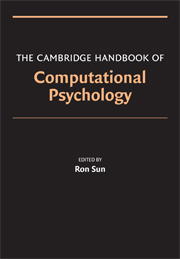Book contents
- The Cambridge Handbook of Computational Psychology
- The Cambridge Handbook of Computational Psychology
- Copyright page
- Contents
- Preface
- List of Contributors
- Part I Introduction
- Part II Cognitive Modeling Paradigms
- 2 Connectionist Models of Cognition
- 3 Bayesian Models of Cognition
- 4 Dynamical Systems Approaches to Cognition
- 5 Declarative/Logic-Based Cognitive Modeling
- 6 Constraints in Cognitive Architectures
- Part III Computational Modeling of Various Cognitive Functionalities and Domains
- Part IV Concluding Remarks
- Author Index
- Subject Index
5 - Declarative/Logic-Based Cognitive Modeling
from Part II - Cognitive Modeling Paradigms
Published online by Cambridge University Press: 05 June 2012
- The Cambridge Handbook of Computational Psychology
- The Cambridge Handbook of Computational Psychology
- Copyright page
- Contents
- Preface
- List of Contributors
- Part I Introduction
- Part II Cognitive Modeling Paradigms
- 2 Connectionist Models of Cognition
- 3 Bayesian Models of Cognition
- 4 Dynamical Systems Approaches to Cognition
- 5 Declarative/Logic-Based Cognitive Modeling
- 6 Constraints in Cognitive Architectures
- Part III Computational Modeling of Various Cognitive Functionalities and Domains
- Part IV Concluding Remarks
- Author Index
- Subject Index
Summary
Keywords
- Type
- Chapter
- Information
- The Cambridge Handbook of Computational Psychology , pp. 127 - 169Publisher: Cambridge University PressPrint publication year: 2008
- 19
- Cited by

